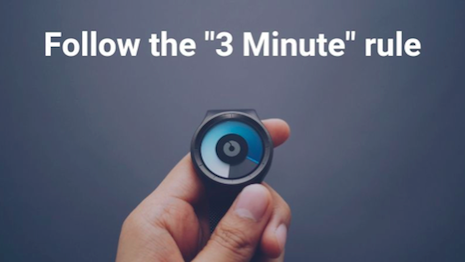By Boris Pfeiffer and Mike Hawkins
Taking a look at any social media page will show you the incredible popularity of online quizzes. In the highly viral world that we live in today, quizzes fill the perfect niche.
This has led to marketers taking advantage of the virality of quizzes in marketing campaigns. This makes sense: every time someone shares a quiz, the company is able to promote its product without any additional work.
However, quizzes are not simply a plug-and-play commodity. There is an art form to crafting the topic and questions so that consumers can share it across their social media accounts.
Here are five easy ways for you to optimize your quiz and make it irresistible to the masses.
A title that makes you want more
If you think titles are not important, think again.
The title will be your audience’s first exposure to your quiz and will need to immediately grab their attention.
For your quiz to go viral it needs to persuade users that taking this quiz will be worthy of their time.
Luckily, there are a few simple hacks that can vastly improve the effectiveness of your title.
Try to keep the length between eight and 60 characters – short and punchy titles allow the user to quickly read, then click to start the quiz.
It also helps to keep it informal: Use “you” and “your” to establish an easy rapport with the user.
A recent study found that posts with a headline in the second person are almost three times more likely to be highly shared across social media.
Do not be afraid to challenge the quiz taker.
Include bold words such as “actually,” “always” or “the most.”
At a psychological level, the user is much more likely to start and share titles such as “How much do you actually know about <your topic>?” or “Do you have what it takes name all these <your topic>?”
Lastly, odd numbers in titles work well. Really well.
Consider adding an odd number to your title to grab attention (e.g. “7 thing you actually don’t know about <your topic>”)
It may seem strange, but quiz titles with odd numbers get up 20 percent more quiz starts.
If you are undecided between multiple titles, test out a few variations of it.
Upworthy challenges its teams to create 25 titles for each quiz. Pick the best couple, then measure how many times each quiz gets shared and pick the best one.
 Boris Pfeiffer is cofounder of Riddle Technologies
Boris Pfeiffer is cofounder of Riddle Technologies
The “Three Minute Rule”
Users today simply do not have the attention span to sit through more than a few minutes of a quiz – no matter how eager they are to see the results.
Research shows that anything more than three minutes will lose the quiz taker’s attention.
The goal is to get the user to the results as quickly as possible.
To achieve this, you should have between five and 10 total questions.
The goal is virality, so you want to get your users from start to finish in a short amount of time so they can share it across their social media accounts.
Simple, high-impact images
The image that corresponds with each specific result is also important.
Posts with high-quality pictures that perfectly complement the description in the results are much more likely to be shared.
The audience can often see through the blandness of stock photos – it pays to invest a bit in your images.
When choosing your images, there are a few things you need to consider.
First, make sure you match the mood of the specific result with the image.
If you are trying to be funny, be sure the picture makes the user laugh. Likewise for a serious result.
When in doubt, keep it simple.
A good image will convey everything in an instant, so there is no need to use anything overly complicated or with a visually cluttered background.
For free high-quality images, we recommend using Pexels. It has thousands of high-quality photos that can be accessed without need to obtain the copyright.
Google is another great option but be careful – by default, searching on Google will not filter for copyright purposes.
Vary your quiz format
The great thing about quizzes is that there are so many options to choose from – right/wrong questions, trivia quizzes and personality tests. There is no one right type of quiz, so try lots of different formats.
If you have viral success in one format, perhaps you have found your niche – keep designing quizzes until the well runs dry. Variety always helps, but it does not make sense to move away from a good thing.
However, if you are struggling to get users to share the quiz, switch it. You never know what skills you have until you try.
 Mike Hawkins is cofounder and director of marketing at Riddle Inc.
Mike Hawkins is cofounder and director of marketing at Riddle Inc.
It is all in the results
A good title will get someone to start a quiz, but you still need to make sure that her results are well-written so that she will want to share her results at the end.
The results are ultimately what makes a user decide whether or not to share the quiz.
Therefore, it is imperative that your results are something worth sharing.
From a quiz taker’s perspective, it is one thing to find out that your true color is actually blue, but you want to know exactly why.
There are a few ways that you can do this: Either have the results’ description say something funny or something that makes the quiz taker seem smart.
The key? Make users want to show their followers how interesting they are.
Good copywriters follow the 50/50 rule – half their time on questions, and half on the results.
If you are stumped, you might want to turn to a freelancer. There are some great copywriters you can hire to craft your quiz results.
Once optimized, your quiz is ready to be shared again – and again, and again..
Do not be afraid if you strike out. Regroup, rethink your strategy, perhaps even pick a different topic, then try again.
- Use your network to your advantage
- Simply ask five to 10 of your friends or colleagues to take your quiz
- Get their feedback – it often pays to gain a different perspective.
AS LONG AS social media rules the online world, pictures will be commented on, hashtags will trend and, most of all, quizzes will be shared.
Get involved – and make your quiz a part of the online conversation.
Boris Pfeiffer is cofounder and Manchester, England-based Mike Hawkins is cofounder and director of marketing at online quizmaker Riddle Technologies, Saarbrücken, Saarland, Germany. Reach them at [email protected] and [email protected].
{"ct":"fkEymTXQNM9b6TqJUGehYRmQYUvP3qNhdcAbEyvNBdWgDnlLhPB3fPL5V3M7rJKKs2JO+0VhDsq1LuTMxfJlQ77sfY4gQRYGaWUyPsKLD9Dnr8GhJs4VsH1i4QK1MQA3ACJXrZauwTGfFWs+QY4GDPmQvY5Nz9CmcIHAFmzXSovx6NZOUUQIJD3htuZ+enlMr+id\/iSLnkn0xHOIONFEeS0H1bAAqqejBGgAD2Ho2gOVCKnub+59IJ1goCVNPEcIWC+sw2AFybu9\/0Sx6NREAODYjX1jupqAiRuPcJhmUozTh17B+p67B6sRnid0huF+pSWUBARVX5if7w4OEeh+dV72+mWpLi8SP9agrFRH6x9Go8X9D4ENNkFnNXu3dqxWQjhVWNImcV5QUgfPEDjXKWxWYrbumuOLgFRIvnd8UuzqibweMDrc4OOuQOnsHZutTqKC+NVaDEd0YpnOxaJ+Hh7Y0t1zQotJSyliYQKaymkJEWufVb2IklniBbG3km30+xEVwEUSWjeLzu1S9gkkOi9p3AQBECCsYStUQotVGtcDav0DRJdsXueMUfCYV0R6+IXMLdoqJrBRalaqE0UBpTD67iZg5tIvuK3nkWZnBJhH+rwK7XTwWUbNxDTlH7ay4Uc+gVVVVd5y192IohJi1\/tMNzHE8W7RIb93ooawyNaALu8mfLAOinXQs9cbKATWwmEcGKMmPmHSjJVCQp9gVUxoPLIkrnC1D6Z6gI7GRMHIYfGxD+gvG9eu5nKhsKnz9f4kcuxJit0DUY0FRrQq2hEdWVtxnWbaR0O2uCrUi0+0JMCuJx6uA80S9JBF+cP4svh1HW6DonIh5dj5c3RTX2yt\/rXkPYgH68s5RLOyPrTvBzmp80qFjF\/qi9kDHGi20aj1WUzoDNiI\/mnDqhtNMG6ihZRlSM+R3pIS2GOeotBVWt4eAsOziXjr4UY1ENlvDSuER7jzaE\/GmDZ1z2Dh1mrPjeSYq\/uafcCKNqCVqxzQ8eaj6uHuHg0eBszdzMH4d39eDd26s2\/K+1BnIftqDY0EB\/oWmFTMz1mfPylH9BrmNtlmN4rO7c0ymg+cNCj\/breobI9Tn1SB4QfZHOLbLIz4FyhX5mbSiSaEr\/TIQ00WuPlm265MHeedIhzg8rLp4vHFqsE1w+Iqk1C5uIyC5dTjumPG4ojZXT2zhNiARRtu0\/CjZwm4nuWydMEG1WOMMYm8FzLcRRI5ZgKuABsYqUEb8m+jKaOD7lpRzvRZUbRuNPOci\/ldezx8n9yth7est8njtOmc70VB9y72SjH8msW5aSs5g5T7S6O55tMq55Rly05Eurj2bOVGeY9TJjNmKKR+fXU+3Ew7eBR7lmgkX+8y\/Ce0Iiys4buycNFSW+svBOD5cB1wYSGZw7r8ETekmzimowMVN3jWi8AGFehVC4hSy2OzZSeeJ1KQUV9050sNk96jtOx2QTBMbPFxSqE8WrC4mtC\/ItZhFSeEsuWvpcfu0e5tlA8p+XXwU5oCp26\/Z4dQ3ELYSMzzHq8tSUv8PzeODVVaRBOC7IYSzmy55Cp7R4VoInad95RMic\/ZXMh4ptofswcxVeG778ANjx+LLhfDXlDrHPpz7Eg7jj4W8YJwZySNhexjku1T45ElOrdajNYeZvAkVRVwHmNbXHlrhfUklxM5cJ\/jxy2pEpVOCSlV08X2rof0n35GZ5wCj\/e23JTViMqOX\/zRU0rkGgRGFR4e+z1p1mo9cPg2FajGZXruOFkO9TbCJ6sM41JMOJdC8Cx25DGfbwmbpLCpIaW3tg2aXwuNGbmX+ZvNAw5q+pAUDi62tc5XVhXN\/YeB4zkcjZ3e5qZeywlpoYGGS9JzFpv2k6SdZPMW5Z1yJdFLMksScCM9MNchX4DfwpVpJGw6f4fLaV32+JZYJXKJVbqSWnisToFeXiaU6c14DGuf2Y7\/z0jqLuBXQ5RAW\/9r01hdP88KX7wx4xTViKGdQad4G5d3BOaaW0HWDJFWbDHZG7hlQ7XWOKyqFoWkJ\/gWnJ0vgq23SqI\/Ttu2DJ\/UDKbpTW6FTOszHNcH2+yn6FRVKqQY38s88K9brJmbl7MC2Lwwg6mePK4n9Pet2SVDGU+fFU8GmWaxyLUY6Z8epdzFORYs8wJhMQ95tYIvk8I\/FhkM8mu3b6f3Bciu9QI3WGWQQlae0kX38sZbTBpYEh2HLlEG4YEQgnfRgEpQsgzFIFLKWB4816BUiMLCRIKw2549qkABmJWW7BVpONqp2a3SMJVeV8lv7cNoYqTOOmOSBcfOa+kwOuobu+H9oQKkvFdJYEIxf2K\/pLljshNCCSoep7HvCi71+ei3PAUpvaRAOT2szGh38pvTABuwmKY2rQBYCwRC4U4VXWyZMF5F570fYRdXTQUS0ZYI77xMpMd2yMGwCmm1ZlkuUIVXStpTJw+WA9iQ+2Bsj\/K8ne2ZmnOVPhuyx0BV49yR5mZ8QtsbgLH\/U37dqrLmVscwcHf7PnunEkCjYp5uoxyRfHsxMqUrrM1W0GCh34rDupS3Cb4B8e7D9ld9Jj73sIei9O\/SKgP7nDywMzWjQKCQfLpyqweexV6RfrUX2wFJ3MpTW2lAvjwmc+UiMEk7sWCQsFOf4QxVvjbDzOe3jwCkZoSF2nQd3PwtIPVNTfoRJUK2jVrV9IK3zOxdXzzRktwfIjKLh0Ga9B5CQvjiBU0KiIUPg+tC1OIxTKCCRWsCZuizbMajNm5entPLsXec6oLGAadAghAwLTXXt5Woyxfi\/++RFTH6o3BDsoKzYIboJ2lMryM1VOjDOBAPyPIpnY5fRUW5vV\/9kyactUx0jWvpP2MoR2xgS4W82Erp4m7OVWYx73oVsvE1qjSOaE63siMfgYXHdIEHOC\/gz1qM2+DXclxG0jAwir6jJwEgItmQJPD6SunOm2lwe7eT3CHYeybwnsHDa6VNtiug4iDBE36yLxXpVj3+62hkA8uzuaHWc5oLHljeWUoRm\/JqlE1i+8XQQbtLVPprk2T7LCc6Uw5GYoGZKV846sNI6\/8FtOkdE0NOncuaaFUbUjV959AeLCbPpBrJlIzFAEswojH\/\/fSyfJ\/nKDlFS9RxycbvjQIoDW450jgovQoZqtc\/rrJfX0b2yJ7MQBc5mHEXVlQT1xTsWRj36APz7qI9l7mh02x+Z3sjU5J05TFZwTSL0vBLWrwKi96irRb8DkJ3SEvRlKLOeDvn9kBscUWpPSeDUfmPk6DCR79V9gQDOFrRFi8O8hBibJMTPXaOEd9DGoq25cNR6WpnMUITt0AxQ14fm4gFIr1nrI5ShQqRXquWiMuxDg+KWCoPBWb0xTJiz+eX73OUAP9f8SXnvujS2\/noB83g2A9Oc9zhL8cT+uHcC1YjieeuXXeZLOaQw6a6kwEDFk5ULPtDEr7nH\/zxim5y381QswoL1T8tcs0uHUxEi9QQYm6Befks6bbUxR6JgPgcdOHu2Bn7xpUOx7sGGD1nmSyxRyCJ9NVOTDQXxQtSZ7yFxJr7jDo8YGvbVVIs7mL\/De5g5oVulTKr2sDR4PUapjM\/1qpHr2w950NGMZddGCEv1a8psJ6\/9D3fU\/tpfXkuNAFUUy9BMO2gBipfx4FxXaUoDm5MuuLnIf1U6+L3nmrJTIOgcDo0oI5kLCslfchRwW\/QXtwHYpcYyqwX6XDS+bbUMrV6gBnBIs2bKdiloDoQcmwb\/0Cek3j20Li+2g7tdpdjIZHSyhn5axmGSsk+RA5mxMXIjtxqbpEf9jCmZaJTEXi2YCSlvKsGtF07cME\/dyQWCLRZBQY\/oQNN8iHgeQXwPlwe5Q\/xY4vyx8qu3VtxQ+BxS3Qnmj+K1SGwX7OhgJBBsfD2q7PoZstUym2h5IfFt0nWtTI1Kgf8E0j5ipUjl2R2gg3trLuOhW3cqqk\/UyoEEVNkLiPwoIyLzSoop2+amVSDugCqg\/k4zD9XvnBeqY5QLT3dYuhe4lfBxPYzE3gCL5iqK1RT4rdmYEyyUSX++GXZVvaXhDmLBRudWk\/jwQNR4l1PmPHChfZ7FqDZ0jQs\/DqyOERlU80qKq4yt9RseKBcp6FO7JStLvzorHYWvj0pUcYm4ATIyYZnwYG+zGJvPuBUEApnQ0a6NM7\/RAB78oAymdC2KdeEB+Vr5sm5HW6r+PhNb6e+qZBbh0UOPOupZXgT6m7vzdxiaPs8KqWtaPZQNdvEJRklOH1qKIjBfzyQmGo2azjepLY3RDFbMmzG\/WH3Wgv1vxLrwrvn2MZcEzLdIYnQzipKYhKivlkeC244HX04UnZuYiDEW6ukRLLMIFQMDyM1w836g7CCh4EBd2bPUFVQBiPVkdB46u1P0YPfQ4HqAG\/mTS9NC\/\/rYZsu7\/5UGvNuL2YeIGhBquBYaQOC\/\/Ndb+E5Jblb+qPUtIUW5D9w\/D6RktxPlCNqqunWJ4CJsya0Lytt9a6rGke6odjqgE1adXUUF23HiQ3mSKUzxLh8EFGkytWRuJ\/0T2pPJUWihcwRqTFcu+D+PTpCP7JpiAOjktIBGEgmEZTGmGtaIGHnOUV6Xk42cFeTjqKy3FIamSRkgjtUL4zE60g+T7sw14F1ZCwcaIixi0cq1CGjw6Ho1ai1SsE1QfGoI53qAzP9srnpD8HumxR4q\/K1E05M+6H9x0rCTvgtPFZ\/lm7a+3tqPzPT8dYIxBUkhVzoKKE9OoMctrz\/mSQS4c265QaNVc76tKFGz59CoBsajRn8NvZcNlFJf4uObJLSgVXgqV3rQ5RkFzUut6opB9REi0dOP+HfSKhhSiMBDuaxxfQPPK4mARe\/9JqWSz14E\/Lj02T34n6YHXi9B6FMLdVJ+JVZQJyx\/\/IWhv3TEFyUfkQyZa+\/scm5AAVtYEsIhiem8JGukyaKiNFWAIzEiKwyZab4h9H5kga+icioJcMUcez+kzrE1wLYdj2jY7zJuV9geEPgrRqcmo1+B2i30sXY1RNzrVcuS4\/GPgQr5oNbu+xkH8fSHRqgiEVslJgtCNvmvM0BzXkMBdK6RDx6ga1fLz9CDaRgqbk6+YZmnlh+3VEYGLeKTOqeZ+MULNb7hImTtDKnHJK8VtZ8\/TJDr34dl23dzz2H7mrUN9Pdt6tsO3kjRM+y4LORmWcYLFt5P1rovv6B\/kJTpHc5I1fKMcJzP2Vz4D6gBdBIfcl1coDHNJPsl3i8SIiUi4iEaLiHKcP4NmKTQIdzdDnxCme8y\/yV9MS3RLP4sQ8lJmR2DpqARruoQxIFSOrNjmPa5kByGxD0EXoOyPNiA7sefsf5PtpjNYhKZetqi6\/8hHVQie\/nbcKE0pcJ94jPEY7VaDTma9zcP130BX6mzOe3c4K43rZeDzL0KH7D4VBrIcXUXZ2DF2ZEiVuOLiV8\/1GCKfsB32kPpR1XN4vpgUda20c6qGWibxflkdDSBKTvwb4sHTLthO4wxiMLbxZMxrSP8bC6oL28jJvqSyiofHJwj5ghXqOZquBN85i7NQSoSpXQDMRmJG6Xp7AXTKr1pEASme8m8V+G\/kNpOWUld+WqfkbKkJjRlP8vZzOpO1h7\/wWm5lYbVrZQhxIqJBE2VH09ZJI\/iiWCdsiugUHUyHbcB\/divkCP19GP5fp339PTVdqrQJhjZcCwUNRd88KdBXx+7jQun+jgHO6NPQq5AvpA\/fEsFO2cnrlVWuP2OX7oqKpVtmts1tz0xPQQQstySSdHMASMQfG+BKZeZZfeggTQz0g6LGyR54Gxmee\/qS0X1A6fpCr3ldQp3g2klVSRNAknnoZGkX3YC6hGnEzBNZFIfMK7WD64EmVt+D+OsP2uezY5Dam7+rMbDMLX7dA3iuVEChceIlqN2dX7RK8smMN7GJU0FYfQSDeOXxAqx5qC8a91iDE9EJGmwso9SoL06UmgY3x9ov\/D\/n3k16eGQOzRRCzlFpnzK7FNJWx5RwX0yeAEBNe7Css3i4WsM\/eSQEPa9gvlkdE1KsE9SeEYr7bYhwSMJksdM5AK5vNvyv2kwqefMejbCTkPyd4NVMNd8\/koNXJn5g3F9VJQVu9Dqxl6L+rbbYSGoZ1QLu+IL3I6+7ZOJ9zj8qjrpxUQzRaF2Ug1lAbvLjOhxothbqwba51NCMmzO4YCGljCVj\/+Y1hEgu\/hCUJK1qJAW\/WDZ26t9oXb3d6ImNJScZlO+3B\/m1s93y884zFgXKZ+87VtKn9Mio6rqhO6zqSbhjJfSYQKmcU25bcCyVGSK0U+3wUGConc+F\/cRiWqBH2nQR5odhcny8TD1QVMdNXUNJl02Jj1v50CQCf\/Rjc0hvO0mXyzA9ez1VnuBZtMePG1X9QeK5WKwNgi2ZdMMhtcqciajxv82DKY+TXcI0BJz+HqHKZoJfKTOvH0PAKN1nDw86qvHL72nU4TkBSeebkGc4BmJFZOF6itWAUDX4RJF8o12LxqjZFznR9SAYoOKNTx\/fUelRpqk999bJrZOKAuzf7RXHa2xwO+5za16TN7IvLtvu3w3ThFOKKK3vMhvDLBYn7iMLqkOD\/jJobJaRnP9LJwtEEOrmJ\/+wFOyiSslk82iEBT7F9Cj+pElX6NTmznwC9uB727OfoGiHtNF7SpOFUIujNadFrsubKwUg\/ydu+0OP4f+TzzixBo11qooF\/tqXJfzF+Gnr8b9c\/PINqNruf9lx+qOCcaQFKNDf4GSsmdu11i47MWEoaYvRyMBH7Ae\/84MMhHWrggtAXnYT6mSaZ1Blf5UZnqwSsKgNSNHakYVKN5BF5m32aXTKEn+ve\/Cc4u0Ord43plTCLQC3wC1lV78DfyJChWlqhC6+yy6jo7CZb7o65ofl60D\/2iaqQbGzNFR6CB9t0wjNmIssYxNj3WIlrFmn4CeLN\/coYbUdRMaamrSw+T5ENFgf9G1fHmky+uZYjAuV86Qylc6nm7kS4+vPxHboKzf\/\/U63eHb2TXtXo4AUsYl6FgKfzPsdF902+72SaOwnPRuz6o4vV5PqmU3b12HfVeg\/HnC4Nnp3mqEUX02wv\/6TG55GLr7LQiQsHwzojEX0VpkQ2lO3lUwxZP7qqtnV6DeHj\/QR6UZbWiNQM1fUZAlw39aVqSaS+MpdT4b+DiE+m5NKKdfHMaK8zBXB7lTHib0OO3n65vEURDvztn+BySE6iL5uCBJkael4BkN+yJboaQ2cF68rxeixkdI4WaJwJoPmXmgERta4fbQN9kO\/TjH23Q5PkW9rz7gXH5zug2jnt7Cp8fNB\/S+tOKnEGJii75hmuA36ZVOpZCBXpS8GO+4GSzfBgdi7\/omcKg5z40VJHMkN5cRwKjn3x9PNmGoxLhhKp9L5NRr4Xrmc5TNY5OTrmquMlQDNsD9PWtPRL97PZoUItDQgntCSUDjmEedrRkHxyydR7ZXr5EWw2LAeU+7VfVZKzYT+dayYIRi8cIj6tKbQQqPCuK6StW+5zAu8G0j4xG6pCII8eKm\/hOEiesvGk2MUWlkSsB5wCgzxLzAmZLYKnicl9OEHROpq1Dew8pAw+aF8YX\/HNPHq7JSwXeAjZqA0A9kfsk7sGwnRJUDa+gmsW+S3AlPZ6CZi5zHgdmPRGtNdLRa10gjB1Ay6m3Q9DugjFphrnLPOyF8N31yfdM6KzvdC6OkGTpxkcxXRBrSaC5X0uJz7W4XRzFdiBzbu6UWsbP30IqLEwHRJNF7Lzi31krLlDamMv2Ry+ez8Y7Mlc7b6cmzcAwAsjJ04uiqe13YYJWu7BHyBJgqIsBbRbFewfk8kUffhPdqPabay1oYVGhfjkBKOW6XCofAZuhhROw45\/zqRxFyotf2M5l+YESO+vb\/xVsIxg\/C4DW1qviOtuZqO8vS59w3Bgx0lQZmwSWgOWdZk6Co1DlZQonHewLHnMuSKOtW5amODssbYPpN+RVEcxdzez6QWO+2sbiCYhxptdadLN1RZVECUjXH2q6a9HuECVatt82yhJn6zWfIu48cEP0Vu+wBH4DKdJXjwGRIexLUCKW8K\/0LPDplKd6F492woQHhUqxX8lsnXkZvnVS9f+B3lWe5ArmucnEq9rX3VqUN7pbM1j3CYlnkNr7v5wFG466wMW4N4CHqohR3B1PkaXMRV0wl7bdsWFc3l77MSWJ2KM3CSn91NF8GUdFOJ2G1TTMa+SQ4VHC66tI5DKAeqeN0qhTKUQxx6TSEuHW3P1k+O2Jvbnt4Kf0GDDWqZkkRVvZ1IUfYG7Dp4Z01rAXDNp4pqhMw0uPDKKrIX3Hhwa5wwv6XEW0p4JuXJBaT8aWo1EeCHz7TgM0YeNi4Xj1Fh77SJiTAYk47GSR9V+Os\/b7boFeeC6IIMS0s1ztkYv6qH7x3bSEgN9XEi24VvftJ8uei1liWWgbf0Y\/n5cyWVJW7HmlGS40G6Ir3LLU7FfAtpIuG3pQJKBkRg3gnr7GY5MzhDHicI6\/gNRmVT3lZzi7PBedBDPIKaGJAa3NP2ZMpS1nvng+OrAeAS5UFqXoI043g7zI7aSXrKWAVEZpj4BPt4Z7qHrnb6prCgKTJ58wn5\/vYQl6GaOvQujcv8Y\/SsyTr6mfdZgiDwyWxqapt5EF7ylCtlfbtk2GQZY\/sPrRjkkRFskoad\/gznsghy5K5CUoZ8uqaTZOto\/xnKA\/WRnrGTHu8ACTLz0Qx5scaw8nVreSkk2ikHfEsGNMGM6nROdUvrDHcT\/yly\/KHCzvTWINCNc1WYZMCHmAdA99kYDowx0bCEw8UvseePVmrAchC53M\/oILE97N3M2qbPYRg7MqhFbrYD32PIStMfwi39r\/MpyOcZNOvrG1RGNbiZEdV7lw9IseoZDDBT\/PwSuFrMj9XQT0JTsCsTWlzJd4Z9J6RUYekC3Ev7JhShJKzvgDzT0pS4iSTlAuOkqpIECrpxK2Ej5lXtB8ZKFtWTdSz7H+OCqw5a2tqLQU8eq3zmicVzGjDl94YIsita2T+ThaP6Iub5nl7QmUJbPpHAhY32qhv1iIpTmtr8RMQFXEBSk0u8cpMwKvxBFsBxPZMGdbnnr2dLdCG78jNKzAiX4bxmiROzA6Rd29rGeISiihSPcyfkNsgSuiSwZx36fzSxB2Gs75\/iwtLbdLV3RjVvHthwQ4C1tr4cuhtAWEXRgduMfvplWXNntNV4\/af7Rt\/bIT5zfrdrAcwpM7vZ9VCTwRmKMdD2xszfIhbncSICIkKIfrhbIaNjLVSVjrwbhuAvBRNremE6\/bqw7oPn2oyhKvCIhpwh9cG\/k2OU\/D\/W\/b+LkDNfLRWbxgkZBVhbcJjripeXvc5Mz26tp78G3NgN4rP0h2F7vWPgiNN0p8VoYJH\/UNc8fJMbvL6tOCwuvn9eGgnKCEVmG0UDa0dYBn123dAYkc70ck9HfjhX2pDwfCs9yqMeXwHdfreG3efWOqd5uK+tf3Y1FyHUaAZe6tnqhI7xtUpmCBpFW7NDPzu87bpQrc6ZMBP4lm6Dw+4tYLGa82eest1fq7LSHWgEm3NZtJYBpPV0zJl8oftf6Rghmp7FWANVlKB1hssfMD8X6uTUUM4aDo7d18rja3b5QwgNVSJKOLvnHDQVkUWkLrLXZQz\/k0UjQRFFuPYdg4MVBmi36EOvlBlJnc\/OYN\/2tnKhBbvg8vnACr6atJNpW8zVLzvnhgCQXBLiaLREEdH35FSHgEX6DD1H5hgYUYLdzbBfonJ2GRiW0lpEImpUq8AipJeDtzYJJdqTv6Hl+ev4Rwo3GMAeHzYIzrzfHwGBEUR2a+BnGzSULPDzXD7dzvMe5rakbDuGmz5p5eGG9+yNOVR3FTB3WS896Vltn84KPFMzYmzaMJhH\/ABC+1PyA5CC61Co5SCclKTsnlHEN8E+lJTdc+fyYLYKpWIMY\/\/C9m005tNjtXFbcXT3nNiOFPBY0BY+WyFiVILYHLqSSfXDikPkYiXWyugFXVOz\/seTKqPoP40crr7QRzf3vgV9ymm1+qdk6AZj3XV06Ivd4sR2r6XozUlyZtz2i9FKi7UfsrtB5wEw2q+LQpirPSo9Ax\/XdtUCyLwO1fDsdXlsuVTdSs6d2b0SmY7Y4s0ntiaDOnbPWoaBCIXmJC50\/OzCqpciHBJ3wL24X1wxsvy07T7qp677FSVXz5ya6T\/MmBq0vcOkiwqiSV9IHnR5E3Sj6tnNLulEL1MuX9ewTgfSoPAHUlRdhvjIiVUOrB6szzB\/v89HnT\/IugrBuJJSq61RgDWs16YTh7bx\/dOCRrHYI3g3Hp0+tiGwZiS\/EkyYq+aHvqPIHd3uZP7zgALkCWIYuMq7nG\/v\/iELVVbB7AVfABO6NnHlRgtaOwF4+0aC+LIdCZaYejdacoVwwOZTkV\/Q7JdyhKvJptaoQ13FDXDIYvkBTKz70vrVrmLwOMHhmY3ahe5V3IGMBfn1OGdzwRHZttRp\/BBpAjpPOU2oToxt2Ogjd5FvF4u6VFc7w7uDXd2YcaP3zj34IHH\/mt7J3u4YEkQ68bLQ9kwCta+lDS8bdi3+sfrj3yzCq9eJwUD4BVWfHXk+TO63luQMB2dDr6P9dqGQlsq9MbRj7on6d4ouZ4OSaEO5DHkOfPrlpkTN31o99Zx0CkRFNJPRObCymhe6kBQCq86RMPEJFwbWgT1YgmNdN9IqmNiwb9tgvXql3cd\/6KhK7MUxOBfHMkc4duairRmBu8pqb9CEAJTt9IqbSp9lpEwrt3CH6hx6jv5hxyic0Sbuw3s6BogMItw2hWq0OhI5X6fWa8vtU6iCEL84j0rj0h5tHohFQfunwyBMZewHmayJz+QkpF7RUrRZkqbYhJ2lb8eeJqzlWWpy2mESFwr4Xsd6dftjPBaRL3KA\/tS66RZAZsTkMh0hicUgbSAoFrvgcQ0eBWqZ4v+sGk0JeaGCe6CtkRPmOkcp86OXmwYYjKpy8123vpVRTogk07aGfjMqgpO7I\/7nYRHPIhTSixD7Lu4Q+VA6xP0GYQpAIir60LwMGJe5EjUK4V5VjFhtWSGlKfbypQ2knfNzRjsydjRuHqhMMbFMGR4Y1+OTDQ+d9QlxcyApW3cM1kxEYJsDUwHv9H\/fX6FCdmq7GGvB3RTNk8ONHf\/Xp\/NKFkEjda4+a3crwOJD4xu1Qw72Anf3RrXFqLyo4M1qYTKGfTLKDLxQns6wXblpcEVaHAM5LBADDoZF0DBHVrD\/xlWdY8+GkUH8u6ozu\/npTkz9gysycQDRhr7\/pKi9oj\/IT41ERl8U6+TlKRM1LMnS7ddEYiiYtWpuS5qfcigMoWySlgUNwN3pbqOXaV0i8WRg4TwKFrpI3gMhqy\/c5wHkCJXwZXfhZJ\/5etbM\/YSB4Y+4vSXlrVxf8ucu3Qloj61qdCDDou55cJyJqS6xYp3XksOr5aj8eJvTTU7bEibGBBHUYBUgYrQHkNyojvyxIwFWhQtaPSr26hnFKBPWXXivEi0tldDqageA0StXfOpqsMvofL+JgP8vpGIvT9C+Q1LZvQ4hYWC3MZDlTvyGW2hGFhj6GHd50H","iv":"30f3d6834235a773cfd27f06f6de2451","s":"df434444427c6e2b"}

 The quiz should be over in three minutes, or else risk losing the taker's attention. Image credit: Riddle Technologies
The quiz should be over in three minutes, or else risk losing the taker's attention. Image credit: Riddle Technologies
 Boris Pfeiffer is cofounder of Riddle Technologies
Boris Pfeiffer is cofounder of Riddle Technologies Mike Hawkins is cofounder and director of marketing at Riddle Inc.
Mike Hawkins is cofounder and director of marketing at Riddle Inc.